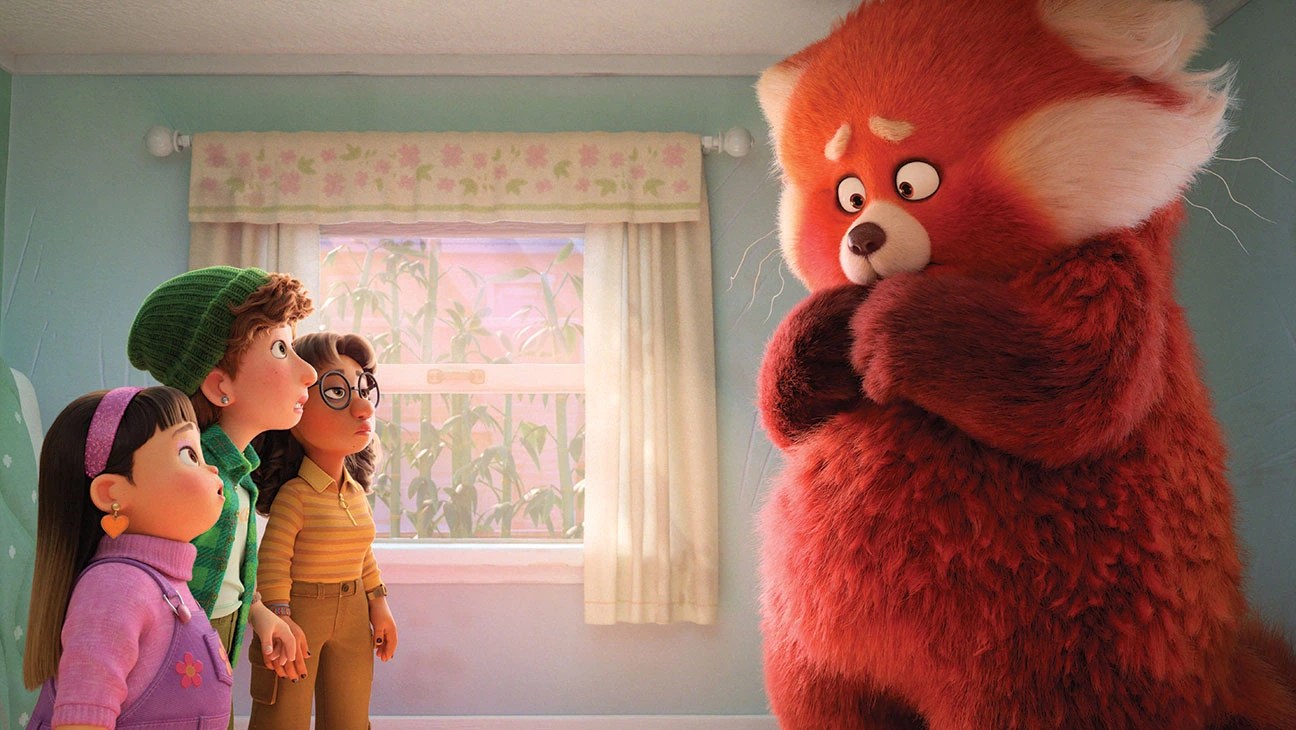‘Turning Red’ Is a Perfect Coming-of-Age Story for Young Boy Band Aficionados
5/5 4 Towns.

When it comes to movies about growing up, many young kids have had to default to the stories telling us of boys and their struggles and that’s it. But Pixar, in recent years, has begun opening up the world of animation to stories that would have truly helped so many of us growing up. One of those movies is Turning Red.
Directed by Domee Shi and cowritten by Shi and Julia Cho, the movie tells the story of Meilin
Lee (Rosalie Chiang) and her complicated relationship with her mother, Ming (Sandra Oh). Trying to balance her life as a teenager growing up in Canada with the overwhelming pressure of being “perfect” for her mother and family, Meilin (also called Mei throughout the film) is thrown into a life of confusion when she suddenly has to learn how to control her emotions or else she turns into a giant red panda—one that her friend Abby (voiced by Pixar artist Hyein Park) loves to call cuddly.
Meilin, prior to becoming a big red panda herself, would work at her family’s historical site as a fake red panda, talking about her family’s history and their connection to the red panda. But her mother didn’t tell her about what would eventually happen to her and, at first, Mei’s life is thrown into chaos because of her need to control her emotions, but she eventually learns to embrace the red panda inside her.
What makes Turning Red so special is that it’s a story so many young girls understand growing up. It’s a look at growing up and changing and accepting those changes within us, and it’s honestly emotional to see a young girl at the center of this movie just trying to balance her life as a teenager while trying to make her mother happy.
Boy bands
One of the main points of contention in the film is, hilariously enough, about a boy band called “4 Town.” Ming doesn’t really know of her daughter’s obsession with the band, and when Meilin realizes that they’re coming to town, she uses her newfound “gift” to help raise money so she can go with her friends—something her mother definitely doesn’t like, given that she wants Meilin to hide her ability from everyone until they can get rid of the red panda, just as they did for the rest of her family.
Set in the early 2000s, the movie takes place in such a specific part of our history. As someone who also grew up in the boy band craze, there’s something so hilariously poignant about this film with how we grew up, but also, it still feels relatable for a younger audience.
Friendship
One of the best parts of the movie is the look into female friendship that doesn’t push a harmful narrative of friends turning on each other. The movie shows the struggle young girls have with one another but also gives us a look into how this friend group works and why they’re so close without making them hate each other.
Mei has friends in Abby, Priya (Maitreyi Ramakrishnan), and Miriam (Ava Morse), who are there for her even when Mei does throw them under the bus to try not to upset her mother. They get angry with her, but they’re still her friends because that’s what friends do. They fight, but they are still there next to each other because they care.
This movie works because it isn’t about “catty” friends. It’s about four girls who love each other, growing up together and understanding their struggles so completely, and it’s refreshing for young girls to see. So often, we’re told in movies and television that girls secretly hate each other when that’s not the truth, so to see a movie like Turning Red embrace that? It’s wonderful.
Understanding
Turning Red has a story of a mother and a daughter not connecting like they think they are at its center, and so, it’s special when that level of understanding that both Ming and Meilin lack eventually changes for them. They’re both too afraid of not being “perfect,” so they don’t open up with one another. When they finally do, their relationship can start to grow and change for the better to help them be there for one another.
Mei thinks her mother has an idealized view of their family and herself and Ming doesn’t tell Mei the things she’s afraid of. The two are both hiding their feelings from the other, and when the truth comes out, it’s a waterfall of emotions and issues to unpack, but they learn to understand each other better, and it’s a journey that I think a lot of us can relate to with our own mothers.
The entire movie is another Pixar punch to the gut in a way that I think younger audiences will really relate to and older audiences will just cry over. It’s reaching into that part of so many of us that longed for a movie about growing up to help us understand what we were going through, and it makes me happy that young kids can turn to Turning Red to understand their relationship to their mothers, and also their love of boy bands.
(image: Pixar)
Have a tip we should know? tips@themarysue.com